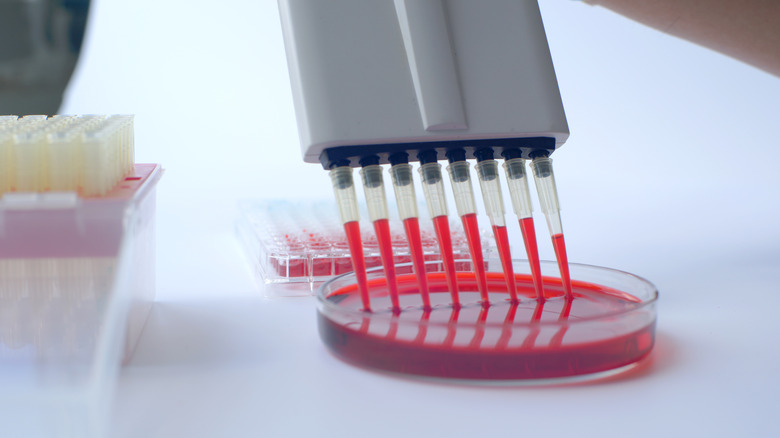What It Means When Your Hematocrit Is High
Blood is essential to life. However, there's more to your blood than the brick-red fluid you see when bleeding. According to the American Red Cross, blood is comprised of different components, including red blood cells, white blood cells, platelets, and plasma. Each of these bears unique functions. For example, red blood cells help carry fresh oxygen throughout the body and make up about 45% of your blood, according to MedlinePlus. What's more, the body makes about two million red blood cells per second, per the source.
Despite the importance of red blood cells, having too much in your body can be a concern, and that's when a hematocrit test comes in. Hematocrit measures the percentage of red blood cells in your blood to determine how high or low it is (via Healthline). A hematocrit test (HCT) is usually part of a complete blood count (CBC), and what's constituted as normal will depend on factors like sex and age.
According to Stanford Medicine, the ideal hematocrit values range between 36% and 48% for women and 42% and 52% for men. For children, the values are between 30% and 44%. Based on this premise, what does it mean if your hematocrit level is high?
What causes high hematocrit levels?
There are various implications if your hematocrit levels are above normal. A high hematocrit level indicates that your body is making too many red blood cells or your blood flow is too low. This can be a sign of lung disease or heart failure, per MedlinePlus. However, hematocrit levels outside the normal range don't always indicate a medical condition. A 2008 study published in the Journal of the American Society of Nephrology reveals that healthy people living at high altitudes have higher-than-average hematocrit levels than those living at sea level.
Another condition associated with higher-than-normal red blood cells is polycythemia vera. According to Johns Hopkins Medicine, scientists are still determining why polycythemia enhances your red blood cell production. In some cases, the condition can stem from a genetic mutation.
Other triggers of high hematocrit levels include smoking and dehydration. According to the Cleveland Clinic, dehydration reduces the water content in your body and the plasma in your blood. Reduced plasma can increase the ratio of red blood cells to blood volume, causing hematocrit levels to rise beyond normal. Regarding smoking, it can affect hematocrit levels by causing an increase in erythropoietin — a hormone that stimulates red blood cell production. Increased red blood cells mean higher hematocrit levels.
Treatment options for high hematocrit levels
Treatment for both high and low hematocrit levels depends on the causes, and your doctor will determine the right treatment option. If poor hydration habits are to blame for your high hematocrit levels, your doctor might recommend rehydrating. However, in cases where high hematocrit levels are caused by polycythemia, the treatment focuses more on managing the symptoms, as the condition can't be cured, according to MedicalNewsToday.
The American Academy of Family Physicians (AAFP) reiterates this claim, stating that the main goal when treating polycythemia is to prevent thrombotic events, like arterial and venous thrombosis and myocardial infarction. These account for the majority of morbidity and mortality cases. Currently, phlebotomy is the most common treatment option, which rids your blood of extra red blood cells, eventually lowering your hematocrit level, per the AAFP. According to the source, around 69% of people with polycythemia use phlebotomy as their first-line therapy. Generally speaking, phlebotomy aims to lower red blood cell counts — some people get this treatment once a week or month until their hematocrit levels drop below 45%, as explained by WebMD.
After phlebotomy, some doctors also prescribe medications like hydroxyurea or Intron A, which slow the production of new red blood cells in the born marrow, keeping hemoglobin levels steady (via WebMD). Radiation therapy is another alternative to slow red blood cell production, but doctors seldom recommend this due to side effects like blood cancer.



